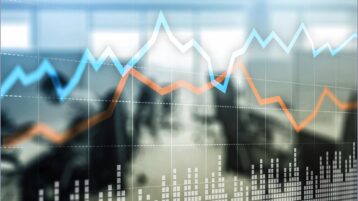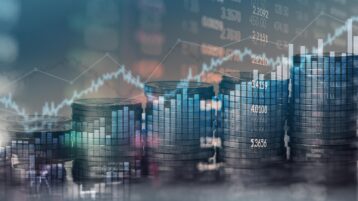The U.S. Federal Reserve has been steadfast in stating its determination to tackle high inflation, even at the expense of economic growth. Greg Bonnell speaks with Marko Papic, Chief Strategist at Clocktower Group, about the impact on markets and the economy if the Fed stays the course.
Print Transcript
[AUDIO LOGO] It's been a tough year for stocks, obviously. But we have seen some rallies amid all of this selling pressure. What should investors be looking for in terms of trying to figure out when the worst is behind us? I think the only thing that really matters right now is Jay Powell. There are so many things we could talk about. We can talk about Ukraine-Russia war. We can talk about Chinese Congress. We can talk about what happened in the United Kingdom with a change in government. There's a lot going on. But I think the only issue is that the Fed has yet not capitulated, hasn't said that it will pause or reflect on the pace of hikes it's done so far. The Reserve Bank of Australia has done it. You've had the ECB do it. You've had the Bank of England basically reinstitute yield curve control. But until the Fed signals that it feels it's done enough, I think your conviction on stocks just simply has to be low. The Fed, of course, is giving us a lot of tough talk, really back to Jackson Hole. I felt like that was Jerome Powell's moment to come out and say, listen, I don't think you've been hearing what I've been saying all along. So he gave us the tough medicine. And that's been the narrative since then. Could they break something, though? I mean, is there a position where the Fed will have to say, we are committed to do this until we can't do it anymore? Well, that's exactly what they've been doing. I think Jay Powell loves proving guys like me wrong. Oh, I'm going to pivot, am I? Well, watch this. And so that's what's been happening. I think we are starting to see signs of things break, though. Obviously, around the world, it's clear. You had the United Kingdom basically face a balance of payment crisis, which is really extraordinary. In the US, however, it's really leading indicators, such as real private investment. And that's worrying. We're right at the cusp of a recession in terms of investment. And investment is far more forward looking than something like the labor market. So if the Fed is serious about focusing on generating slack in the labor market. If that's what they're looking for, we're going to have a calamitous recession, not just a run of the mill recession. Because once you start generating slack in the labor market, it's too late for you to start pivoting back towards some sort of a more conciliatory or dovish way to approach hikes. So I think that there's plenty of evidence that they are starting to break things. And they're either going to pivot or pause for reflection, as Lael Brainard mentioned a couple of days ago. They're either going to do that within the next couple of weeks or we are headed towards a much tougher recession than anyone really thought, including myself. Really? So that timeline is that tight, in the next couple of weeks we could see either the Fed make a move, a pivot in a different direction, or just stay the course. And then perhaps we need to be even more worried about the economic damage they could create. Absolutely. I think the next rate hike is probably their last. I mean, I would go as far as to say that. It's QE by Q2. If you want a nice little clickbait-- QE by Q2. QE by Q2. I mean, look, this is something that I think is very important to understand. We have, consumers have $2 trillion worth of savings, got it. Lots of fiscal stimulus, got it. Ultimately, though, what matters for the economy is CEO confidence and the decisions by those CEOs to continue to invest. And those two look really bad. CEO confidence is on par or lower than levels seen 9/11, 2008, 2020. So these are really, really deep recessions. And I think that the real economy, which has in the past reacted very aggressively at the smallest amount of hikes, is now having to deal with considerable amount of Fed funds rate increase in a very short period of time, which is why I think that they are setting themselves up for a pivot. I mean, Lael Brainard's speech, I think everybody should read it. She's introduced a lot of verbiage that I think will become part of the lexicon of the Fed going forward, such as reflection. Let's reflect on what this amount of hikes has done to the real economy. I mean, that's important. That's a great point you bring up. Because of course, monetary policy, central banks making the moves that they do, the effects, they get felt pretty quick in the housing market and some asset classes. But the effects are supposed to be felt further along the road down the economy. With all these jumbo sized rate hikes, can we even know what they have sort of laid out, what they have triggered in the months to come? No. I don't think so. And that's why Lael Brainard, I think, had a point. And if you look at what's happening around the world, normally when the Fed starts a rate hiking cycle, the countries and economies that suffer are in the emerging market and frontier market space. That was certainly the case in the '80s, '90s. And then it takes 12 to 18 months for these calamitous crises to come back to the US. And then the Fed wakes up and says, oh, look, LTCM crisis. This time around, it's not the South Koreas, or the Thailands, or the Russias, or the Brazils. They're actually fine. A lot of those countries raised rates in 2021 on a proper timeline. The real problem is happening in developed markets. And a lot of these economies do have a speed dial access to the Treasury and the Fed. So they can actually tell the central bank of the US, hey, listen, we're breaking things in the United Kingdom. United Kingdom is a geopolitical ally of the US. United Kingdom is not South Korea or Thailand during the East Asia crisis. So I think that the Fed is going to have to take that into account and not just think about what's happening domestically, but also internationally on a much faster timeline than it has in the past. Ultimately, the fight here is against inflation, right, that it didn't turn out to be transitory and they were hoping that it wouldn't. It didn't. So now they've had to go pretty aggressive. Are we making any progress on that front? Oh, absolutely. I mean, CPI has definitely peaked. I mean, I don't see how it hasn't. Maybe some geopolitical event happens where we lose a lot of supply of oil, exogenous event. But CPI is headed towards 4% to 6% by the next 6 to 12 months. And I think the Fed knows that. I mean, I write investment research on the beach in California. The 300 PhDs at the Fed know this. So they are fighting a war that was won 12 months ago. And I don't think that that's something that they're truly concerned about. I think what they're concerned about is the politics of this. Real wages in the US are deeply negative. And that is creating a deep angst in the economy. And so I think that once the CPI starts turning, the political pressure on the Fed to be so hawkish is also going to ease. And we're really close to that. That's why I think we're weeks away from some sort of a, I don't want to say pivot, because people think it's cuts, like some sort of a calming down of the hawkishness. Why? Because within weeks we're going to start seeing the hashtag recession start to trend more to hashtag inflation in the political sphere. And that's when the Fed is going to have to respond to that. Fascinating stuff. Thanks for joining us today. Absolutely. A real pleasure. [AUDIO LOGO]
[MUSIC PLAYING]
[MUSIC PLAYING]



























